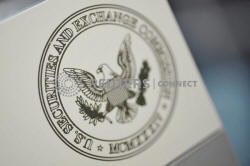U.S. regulator opens inquiry into Wall Street's blank check IPO frenzy -
sources
 Send a link to a friend
Send a link to a friend
[March 25, 2021] By
Jody Godoy and Chris Prentice
NEW YORK/WASHINGTON (Reuters) - The U.S.
securities regulator has opened an inquiry into Wall Street's blank
check acquisition frenzy and is seeking information on how underwriters
are managing the risks involved, said four people with direct knowledge
of the matter.
The U.S. Securities and Exchange Commission (SEC) in recent days sent
letters to Wall Street banks seeking information on their special
purpose acquisition company, or SPAC, dealings, the four people said.
SPACs are listed shell companies that raise funds to acquire a private
company with the purpose of taking it public, allowing such targets to
sidestep a traditional initial public offering.
The SEC letters asked the banks to provide the information voluntarily
and, as such, did not rise to the level of a formal investigative
demand, two of the sources said.
However, one of those two people said letters were sent by the SEC's
enforcement division, suggesting they may be a precursor to a formal
investigation.
This person said the SEC wanted information on SPAC deal fees, volumes,
and what controls banks have in place to police the deals internally.
The second above source said the SEC asked questions relating to
compliance, reporting and internal controls.
Representatives for the SEC did not immediately respond to requests for
comment outside U.S. business hours.
Wall Street's biggest gold rush of recent years, SPACs have surged
globally to a record $170 billion this year, outstripping last year's
total of $157 billion, Refinitiv data showed.
[to top of second column] |

The U.S. Securities and Exchange Commission logo adorns an office
door at the SEC headquarters in Washington, United States, June 24,
2011. REUTERS/Jonathan Ernst/File Photo
The boom has been fueled in part by easy monetary conditions as central
banks have pumped cash into pandemic-hit economies, while the SPAC
structure provides startups with an easier path to go public with less
regulatory scrutiny than the traditional IPO route. But the frenzy has
started to meet with greater investor skepticism, and has also caught
the eye of regulators.
This month, the SEC warned investors against buying into SPACs based on
celebrity endorsements and said it was closely watching SPAC disclosures
and other "structural" SPAC issues.
Investors have sued eight companies that combined with SPACs in the
first quarter of 2021, according to data compiled by Stanford
University. Some of the lawsuits allege the SPACs and their sponsors,
who reap huge pay-days once a SPAC combines with its target, hid
weaknesses ahead of the transactions.
The SEC may be worried about the depth of due diligence SPACs perform
before acquiring assets, and whether huge payouts are fully disclosed to
investors, said a third source.
Another potential concern is the heightened risk of insider trading
between when a SPAC goes public and when it announces its acquisition
target, the second source added.
"Wall Street's biggest banks are being asked: what's going on?" the
person said.
(Reporting by Jody Godoy in New York and Chris Prentice in Washington;
Editing by Michelle Price and Christopher Cushing)
[© 2021 Thomson Reuters. All rights
reserved.] Copyright 2021 Reuters. All rights reserved. This material may not be published,
broadcast, rewritten or redistributed.
Thompson Reuters is solely responsible for this content. |